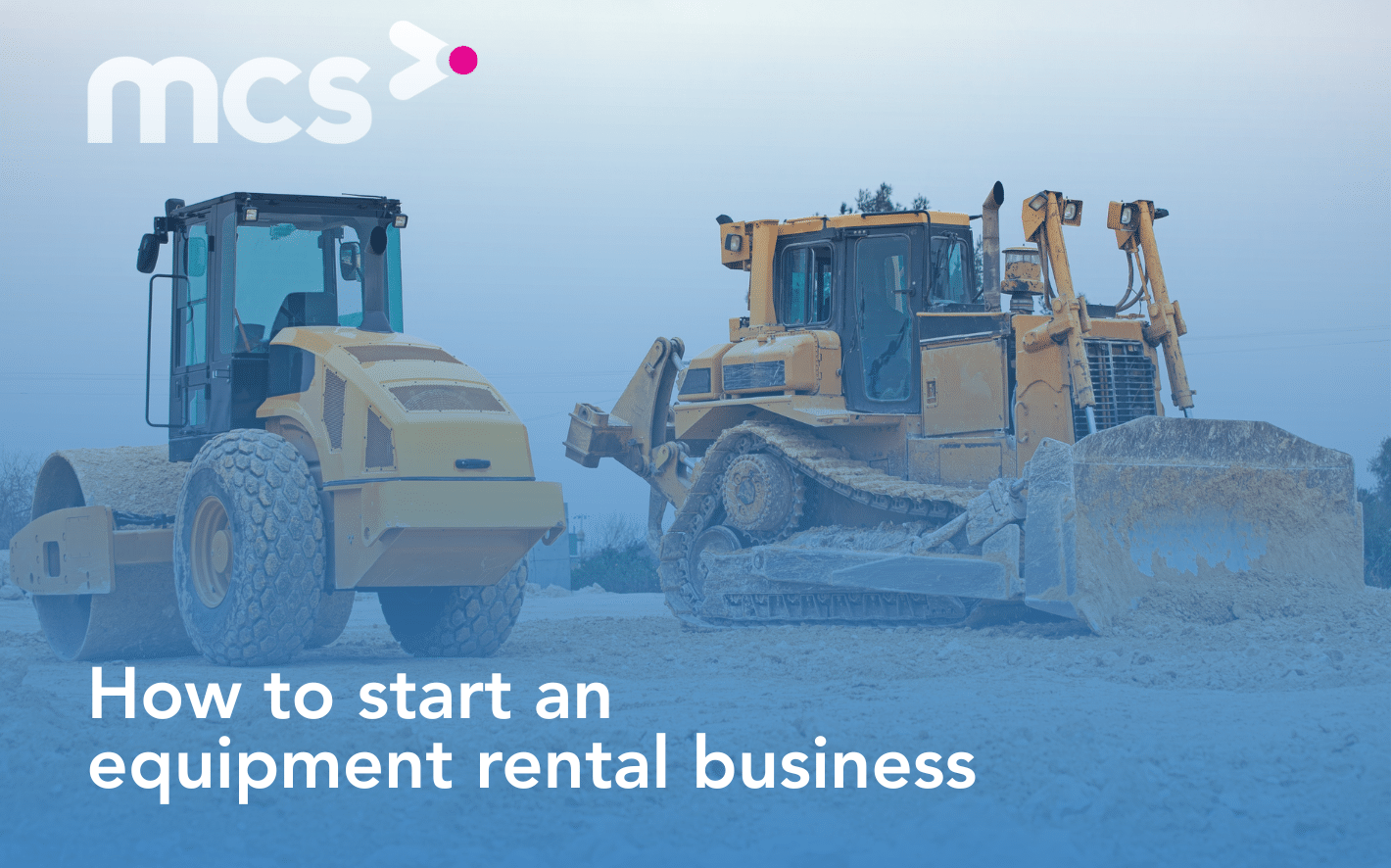How to Start an Equipment Rental Business
Starting an equipment rental business is more than just buying tools and waiting for customers to show up — it’s about helping other hardworking people get the job done. Whether you’ve worked in construction for years or you’re just looking for a smart way to grow your income, the rental industry can be a rewarding path. But like any good build, success starts with a solid foundation.
At MCS, we’ve spent decades helping rental companies run smoother and scale faster. Here’s how to start an equipment rental business the right way — with clear steps, honest insights, and the kind of tools that make your life easier.

Understanding the Equipment Rental Market
Before you buy your first piece of equipment, it’s worth understanding the market you’re stepping into. The equipment rental industry has grown steadily as more companies choose to rent instead of purchase. Renting helps them save money, stay flexible, and take on bigger projects without massive overhead — and that’s where you come in.
Market cycles matter, too. Construction usually peaks in the warmer months, while event rentals tend to boom in the spring and summer. When you plan ahead for these busy and slow seasons, you can keep your business steady all year long.
Startup costs depend on your focus — someone starting with light tools and trailers might spend tens of thousands, while heavy machinery operations can easily reach six figures. The good news? Smart planning and reliable software can help you make every dollar count.
Choose Your Rental Niche
There’s no one-size-fits-all rental business. The industry covers everything from construction and scaffolding rentals, to AV and event equipment, to medical supplies and portable restrooms. The key is to pick a niche that matches your experience, your budget, and the demand in your area.
When deciding, ask yourself:
- Who needs my equipment most often?
- What gaps exist in my local market?
- What do I already know and do well?
A clear focus helps you build trust faster and keep your inventory lean and profitable.
Business Planning and Market Research
Every successful business starts with a plan — and no, it doesn’t have to be complicated. Write down who you want to serve, what you’ll offer, and how much it’ll cost to get started. Study your competition: What are they charging? Where are they falling short?
This research will shape your business plan — the roadmap that keeps you on track when things get busy. Think of it as your first blueprint for success.
Legal Requirements
Once you’ve got your plan, make it official. Register your business name, secure the right licenses, and double-check your insurance coverage. In the rental world, you’ll also need strong contracts to protect both you and your customers.
Depending on your niche, you might also need to follow health and safety or transportation regulations. Taking time to get this right from the start saves you from headaches later on.
Equipment Procurement
Your inventory is your business. Buy from trusted suppliers who value reliability and safety as much as you do. If you’re on a budget, start small — maybe a few key pieces you know will stay in demand — and build over time.
Create a simple system for tracking maintenance and inspections. The last thing you want is to send out broken equipment that costs you customers. Many rental companies use MCS equipment maintenance software to stay on top of servicing and repairs automatically, which keeps things running like clockwork.
The Role of Equipment Rental Software
Running a rental business is more than handing out keys or tools — it’s managing bookings, tracking inventory, billing customers, and keeping tabs on what’s available. That’s where rental management software makes all the difference.
MCS Rental Software brings everything into one place: contracts, quotes, invoicing, delivery schedules, and even rental reporting that shows which assets make you the most money. It’s built to fit your business, whether you rent heavy equipment, tents, or portable restrooms.
With MCS, you don’t need to be a tech expert — you just need a good system that keeps you organized, saves you time, and helps you grow.
Setting up Operations
Next, set up your home base. You’ll need a secure space to store equipment, an area for maintenance, and enough room for trucks or trailers if you deliver.
If you’re hiring, look for people who take pride in doing things right — the kind of folks who care about details and treat customers like neighbors. A friendly, dependable team is one of your biggest assets.
Marketing and Customer Acquisition
Now it’s time to spread the word. Start local — claim your business on Google, make sure your website is easy to use, and post regular updates about new inventory or specials. Use local SEO so people searching “equipment rental near me” can find you easily.
Partnerships are powerful, too. Connect with local contractors, landscapers, and event planners. Offer referral discounts or bundle packages. When you build relationships in your community, customers come back — and they bring their friends.
Building a Rental Business That Lasts
Starting an equipment rental business takes grit, patience, and a plan. But with the right tools — both in your hands and behind the scenes — you can build something that lasts.
From understanding your market to managing your day-to-day operations, MCS Rental Software helps rental businesses like yours work smarter, not harder. Because when your systems run smoothly, you can focus on what really matters: helping people get the job done.
Learn more about how MCS Equipment Rental Software can help you start, scale, and simplify your rental business.
Ready to elevate your rental business?
Connect with our expert team to discover how MCS Rental Software can drive your success. We’re here to answer your questions and help you find the perfect solution.



